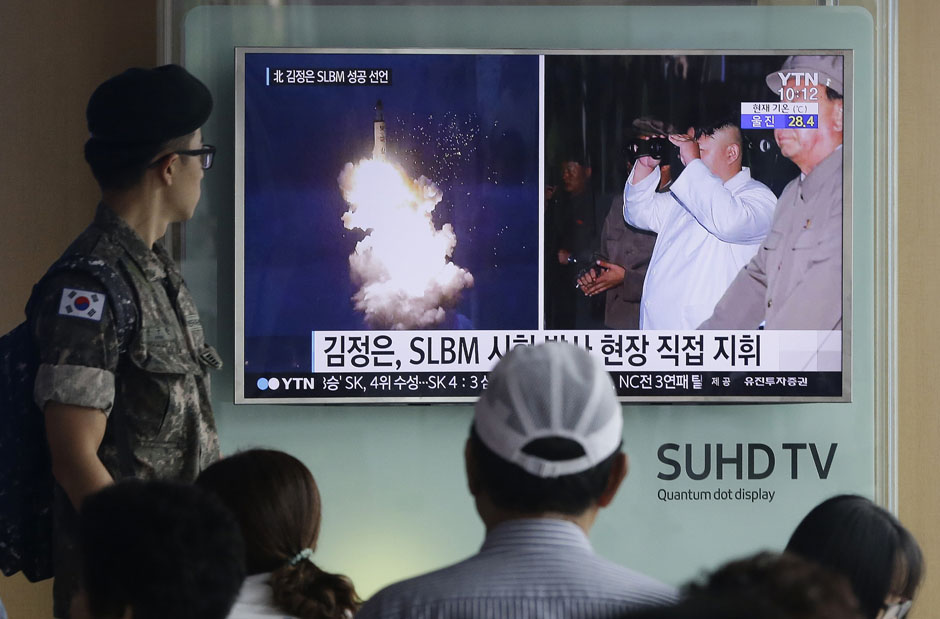-
Tips for becoming a good boxer - November 6, 2020
-
7 expert tips for making your hens night a memorable one - November 6, 2020
-
5 reasons to host your Christmas party on a cruise boat - November 6, 2020
-
What to do when you’re charged with a crime - November 6, 2020
-
Should you get one or multiple dogs? Here’s all you need to know - November 3, 2020
-
A Guide: How to Build Your Very Own Magic Mirror - February 14, 2019
-
Our Top Inspirational Baseball Stars - November 24, 2018
-
Five Tech Tools That Will Help You Turn Your Blog into a Business - November 24, 2018
-
How to Indulge on Vacation without Expanding Your Waist - November 9, 2018
-
5 Strategies for Businesses to Appeal to Today’s Increasingly Mobile-Crazed Customers - November 9, 2018
United Nations condemns North Korean missile launches; Obama pushes sanctions
“The reason we’re deploying Thaad [Terminal High Altitude Area Defense] is because of the provocations from North Korea and the constant testing of ballistic missiles and the nuclear tests as well”, said Ben Rhodes, a deputy national security adviser for U.S. President Barack Obama, in a press briefing in Vientiane, Laos.
Advertisement
On Monday, North Korea fired three Rodong-type midrange missiles off its east coast, drawing swift condemnation from the USA and other world leaders. The missiles landed in Japan’s air defense identification zone after flying around one thousand kilometers.
The country’s ruler watched the test firing and the state-run media reported Kim “stressed the need to continue making miraculous achievements in bolstering up the nuclear force”.
The U.N. Security Council on Tuesday issued a statement condemning the latest North Korean ballistic missile launch, “in flagrant disregard of the repeated statements of the Security Council”.
In the statement, the Council members said they further regretted that North Korea is diverting resources to the pursuit of ballistic missiles while its citizens have great unmet needs.
“Such actions by North Korea over the past few years only serve to further increase regional tension and hinder the prospects for lasting peace on the Korean Peninsula and the world in general”.
“We very much favor a quick and firm reaction by the Security Council to this new provocation”, he said.
“We are going to work diligently together with the most recent United Nations sanctions”, Obama told reporters after meeting with South Korean President Park Geun-hye.
From 2006 to March 2016, the Security Council adopted five resolutions, including punitive measures such as imposing economic sanctions against North Korea, four of which were related to nuclear testing.
South Korean President Park Geun-hye has held talks with both country’s leaders since Saturday, with Beijing in particular being seen as carrying a vital influence over Pyongyang considering their traditional alliance.
Defense Minister Tomomi Inada said they fell off the northwestern coast of Hokkaido.
In return, the South-Korean president stated that Seoul will adopt a “strong” attitude regarding any challenges coming from North Korea.
The launch was widely condemned by the U.S. and other major powers, but analysts saw it as a clear step forward for North Korea’s nuclear strike ambitions. Jeffery Lewis, director of the East Asia Non-proliferation Program at the Middlebury Institute of International Studies told the Guardian, “They just don’t care what the Chinese say anymore”.
Still, Obama said he was open to dialogue with North Korea.
Then, the 15-member council agreed to a resolution to counter the worldwide threat posed by the newly developed missile.
Advertisement
Last month as well, the Kim Jong-un regime launched a missile, this time from a North Korean submarine.




























